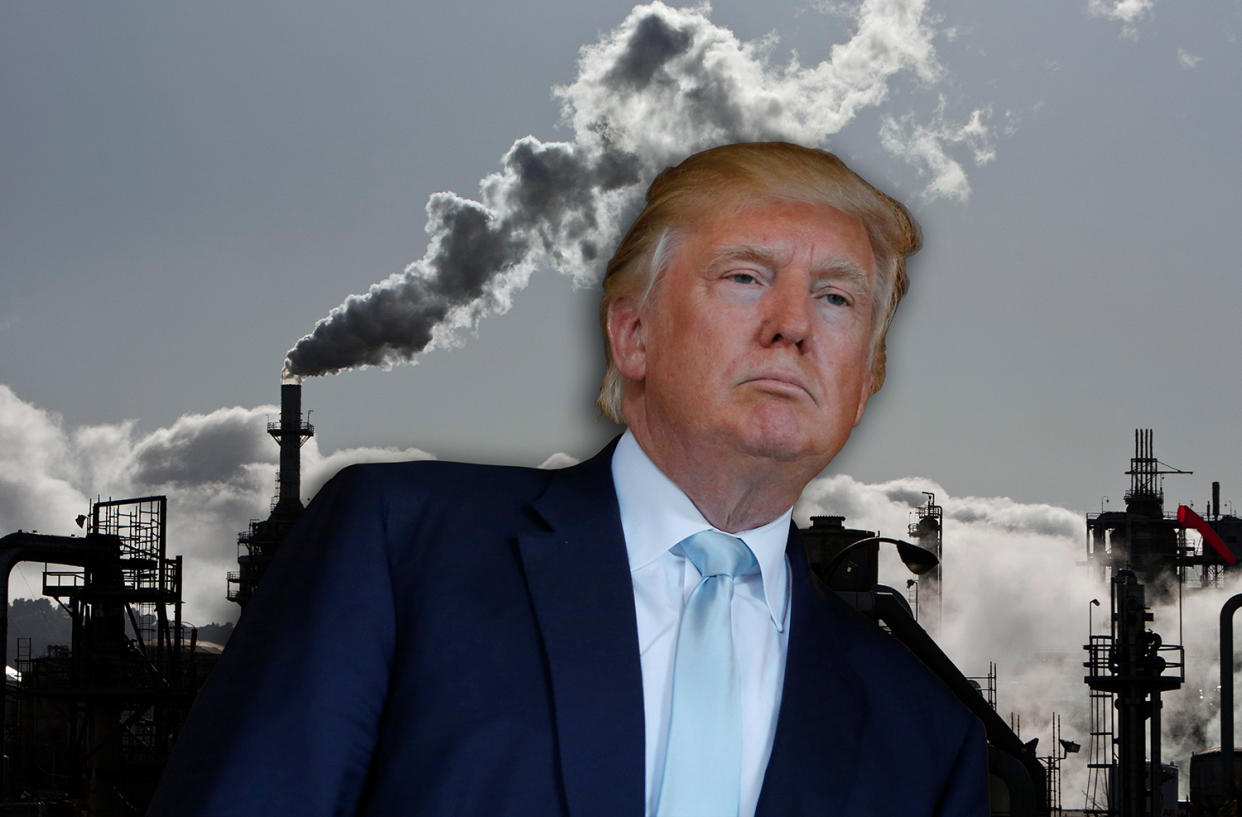Stories to watch: The war on regulations

Donald Trump is in the White House, and Yahoo News is taking a look at the top stories to watch in his first 100 days. From the unusual role family members will play as White House advisers, to his promises to aggressively transform U.S. trade policy, and from investigations into Russian interference in the election to his relationship with Paul Ryan, we’ll be rolling out 15 stories over five days — signposts for the road ahead.
_____
THE STAKES
During the campaign, Donald Trump made extravagant, if vague and sometimes contradictory, promises to dismantle much of the modern regulatory state, specifically targeting the Environmental Protection Administration and the Department of Education. Could this be the year it actually happens — and what would that mean for American society?
____
THE STORY
Promises to roll back federal regulations and even eliminate entire agencies have been a staple of Republican rhetoric for decades. Rick Perry, Donald Trump’s choice for secretary of energy, ran in 2012 on a pledge to eliminate three Cabinet departments — including the one he has now been named to run.
Eliminating an entire Cabinet department almost never happens. The federal regulatory bureaucracy survived two terms of Ronald Reagan’s assaults largely intact, reflecting either its remarkable tenacity or the fact that while regulations are unpopular in the abstract, the public generally likes to have government protecting it from things like disintegrating tires and drugs that cause birth defects. A position paper that appeared on the Trump campaign website promising to relax federal food-safety regulations was quickly removed. Just as Republicans are discovering that repealing Obamacare may be more popular as a slogan than a policy, they may not want to campaign on a platform of letting kids eat undercooked hamburgers.
Government agencies, and their broad policy mandates, are established by law. Eliminating or changing them would require legislation, which Democrats could block in the Senate either with a filibuster or by peeling off some Republican votes. Agencies can modify or eliminate specific regulations on their own, but there’s a process for this that can run for months or years; that’s how they got on the books in the first place. During the campaign Trump pledged to get rid of “70 percent” of federal regulations, but he’d probably need to be in office for the rest of the century to achieve that. And his count presumably was inflated by his ignorance of how the government actually works; he and other candidates loudly promised to get rid of the unpopular Common Core education standards, ignoring the fact that the federal government doesn’t impose or enforce them.
There are some categories of regulations that seem particularly vulnerable, however, and worth watching in 2017. That includes those with a high symbolic value, such as gun-control measures. Trump has signed on to all of the National Rifle Association’s agenda, although he chose not to keep his promise to sign an order ending gun-free zones in schools “on his first day” in office.
Another category includes rules with a large economic impact concentrated on a powerful industry, especially where the regulations are complicated and hard for the public to understand. That’s a long way of saying “Dodd-Frank,” the banking-regulation bill that Trump has said he wants to repeal, a position many Republicans agree with. Dodd-Frank is likely to undergo some tinkering, if not outright repeal. How much ordinary Americans will notice or care in the short run is unclear — although they may take notice if and when there’s another banking crisis.
Also vulnerable are regulations on extracting, transporting and burning fossil fuels, where even minor changes could have a disproportionate impact on the profits of a handful of coal and oil companies and utilities. That they could also impede efforts to combat climate change is of concern only to those who believe that global warming is a problem, which seems not to include Trump or most of his Cabinet. Trump’s appointees could fulfill his campaign promise to revive the Keystone XL pipeline from Canada to the Midwest, and, over time, open up more offshore areas for drilling, projects that, carbon emissions aside, almost inevitably will result, sooner or later, in major oil spills.
____
THE PLAYERS
The key figures in these battles will be second-tier Cabinet officials and sub-Cabinet officials. Precisely because some of these changes may be unpopular, they are likely to take place out of public view, leaving it up to the press and public-interest groups to keep the public informed.
Scott Pruitt: Named to head EPA. The attorney general of Oklahoma, he has been described as a climate-change denier and a frequent opponent of EPA in court over regulations affecting energy, water and air pollution.
Betsy DeVos: Trump’s nominee for education secretary. DeVos, a major Republican and right-wing donor from Michigan, is a strong supporter of opening public education to competition from private, religious and charter schools.
Richard Cordray: Director of the Consumer Financial Protection Bureau. Appointed in 2012 by Barack Obama to run the agency charged with protecting customers in their dealings with banks, mortgage lenders and other financial institutions, he has been under criticism from Republicans for being too tough on business. At least two Republican senators have called on Trump to remove him, although it’s not clear he has that authority.
Tom Price: Nominee to head the Department of Health and Human Services. Price, a surgeon and Republican congressman from Georgia, will be in the spotlight over the administration’s plans for repealing Obamacare. But he also belongs to a physicians’ group that has opposed virtually every federal health care initiative and raised questions about the safety of childhood vaccines.
Read more from Yahoo News:




